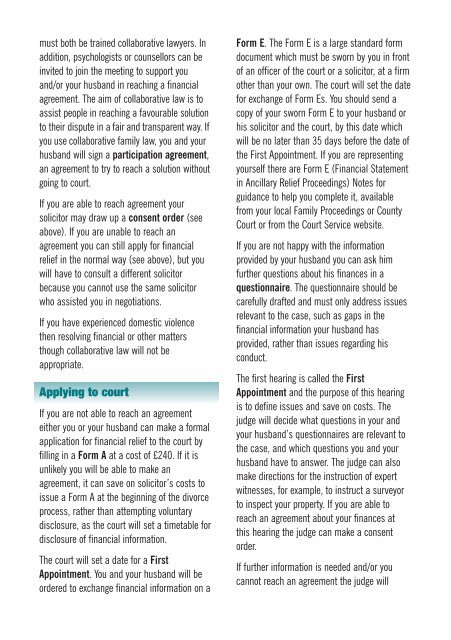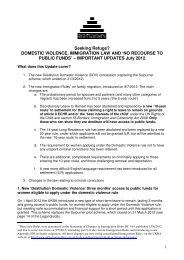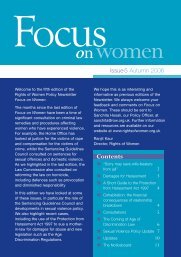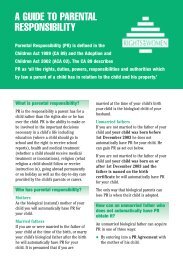Financial Arrangements After Marriage Breakdown - Rights of Women
Financial Arrangements After Marriage Breakdown - Rights of Women
Financial Arrangements After Marriage Breakdown - Rights of Women
You also want an ePaper? Increase the reach of your titles
YUMPU automatically turns print PDFs into web optimized ePapers that Google loves.
must both be trained collaborative lawyers. In<br />
addition, psychologists or counsellors can be<br />
invited to join the meeting to support you<br />
and/or your husband in reaching a financial<br />
agreement. The aim <strong>of</strong> collaborative law is to<br />
assist people in reaching a favourable solution<br />
to their dispute in a fair and transparent way. If<br />
you use collaborative family law, you and your<br />
husband will sign a participation agreement,<br />
an agreement to try to reach a solution without<br />
going to court.<br />
If you are able to reach agreement your<br />
solicitor may draw up a consent order (see<br />
above). If you are unable to reach an<br />
agreement you can still apply for financial<br />
relief in the normal way (see above), but you<br />
will have to consult a different solicitor<br />
because you cannot use the same solicitor<br />
who assisted you in negotiations.<br />
If you have experienced domestic violence<br />
then resolving financial or other matters<br />
though collaborative law will not be<br />
appropriate.<br />
Applying to court<br />
If you are not able to reach an agreement<br />
either you or your husband can make a formal<br />
application for financial relief to the court by<br />
filling in a Form A at a cost <strong>of</strong> £240. If it is<br />
unlikely you will be able to make an<br />
agreement, it can save on solicitor’s costs to<br />
issue a Form A at the beginning <strong>of</strong> the divorce<br />
process, rather than attempting voluntary<br />
disclosure, as the court will set a timetable for<br />
disclosure <strong>of</strong> financial information.<br />
The court will set a date for a First<br />
Appointment. You and your husband will be<br />
ordered to exchange financial information on a<br />
Form E. The Form E is a large standard form<br />
document which must be sworn by you in front<br />
<strong>of</strong> an <strong>of</strong>ficer <strong>of</strong> the court or a solicitor, at a firm<br />
other than your own. The court will set the date<br />
for exchange <strong>of</strong> Form Es. You should send a<br />
copy <strong>of</strong> your sworn Form E to your husband or<br />
his solicitor and the court, by this date which<br />
will be no later than 35 days before the date <strong>of</strong><br />
the First Appointment. If you are representing<br />
yourself there are Form E (<strong>Financial</strong> Statement<br />
in Ancillary Relief Proceedings) Notes for<br />
guidance to help you complete it, available<br />
from your local Family Proceedings or County<br />
Court or from the Court Service website.<br />
If you are not happy with the information<br />
provided by your husband you can ask him<br />
further questions about his finances in a<br />
questionnaire. The questionnaire should be<br />
carefully drafted and must only address issues<br />
relevant to the case, such as gaps in the<br />
financial information your husband has<br />
provided, rather than issues regarding his<br />
conduct.<br />
The first hearing is called the First<br />
Appointment and the purpose <strong>of</strong> this hearing<br />
is to define issues and save on costs. The<br />
judge will decide what questions in your and<br />
your husband’s questionnaires are relevant to<br />
the case, and which questions you and your<br />
husband have to answer. The judge can also<br />
make directions for the instruction <strong>of</strong> expert<br />
witnesses, for example, to instruct a surveyor<br />
to inspect your property. If you are able to<br />
reach an agreement about your finances at<br />
this hearing the judge can make a consent<br />
order.<br />
If further information is needed and/or you<br />
cannot reach an agreement the judge will
















